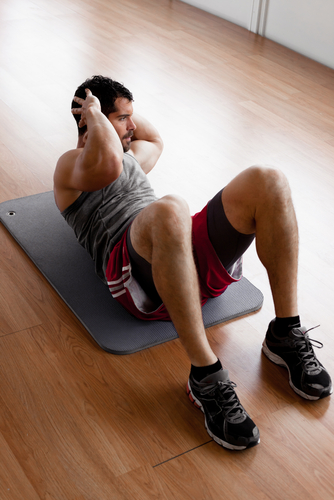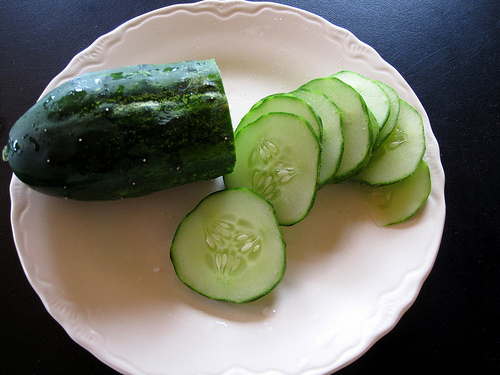
By Gary Gibson, PhD
 Many of us want to lose weight and will at various times start a diet or a workout routine to try and do something about it.
Many of us want to lose weight and will at various times start a diet or a workout routine to try and do something about it.
More often than not, our good intentions don’t produce the results that we want and we quit early, generally due to disappointment and discouragement.
One of the biggest culprits behind this is looking at what we weigh on a scale, instead of looking at what most of us really want, which is actually to lose fat.
Looking at how our weight is changing is a very poor way of checking our progress unless we understand what is happening to our bodies and how that relates to the weight measurements we see on our scales.
In short, we inadvertently trick ourselves as to how well, or how poorly we are doing and that often leads to daily disappointments.
Dehydration May Show as Weight Loss
For instance, if someone who weighed 200 lbs becomes 1% dehydrated they would see a 2lb change on the scales, this can in some instances be bigger than the weight loss someone sees in a week.
Also, if we weigh ourselves shortly after eating, the weight of the food itself can also distort our readings.
The way around this is to accept that day to day we may see a variation of a few pounds, and so we should look for long term trends in our measurements.
Don’t Quit When You Stop Losing Weight
Another way we can get discouraged is when we first start a weight loss program, most people will experience fairly rapid loss and will of course feel very excited about it.
After this period of rapid weight loss, it will either drastically slow down or even in some cases, go back up. It’s when this stage is hit that we can become very despondent and this is where the biggest risk for quitting comes.
Ironically, this is the start of the real fat loss in the body, so quitting at this point means the work to get here is entirely lost as if we quit we will see rapid weight gain till we get to roughly where we were before we began our program.
Fat vs. Glycogen Loss
To understand why this is, we need to realise that the body has two entirely different energy stores, fat and glycogen. I like to think of them as the long term store (fat) and the short term store (glycogen) because that is how they act.
Glycogen is stored in the body in the liver and in the muscles and is used for rapid conversion to energy particularly when we exercise hard. The average person stores about 5 – 10 lbs of hydrated glycogen and these stores tend to be used first by the body rather than fat (see the report by Kreitzman 1992).
The thing about glycogen is that it doesn’t hold a lot of energy, its benefit over fat is that it’s quick release. A calorie loss of 1800 calories is enough to lose 1lb of pure glycogen, or as it’s stored in the body, around 3 lbs of hydrated glycogen. That’s why initial weight loss is so fast, because what we are actually doing is depleting our glycogen store.
For example, if we look at someone who goes on a low carb diet and has a calorie deficit of around 500 calories per day then, after four days they will have lost around 4 lbs, and will be feeling great about it. The thing about it, people diet to lose fat and not glycogen and at this point very little fat will have been lost.
In fact, they would need to keep dieting for another week or more to get to the point where they were fully glycogen depleted. That’s about the point when the body’s fat stores start really going down simply because the body doesn’t have much else of a choice.
Fat Burning is Enhanced When Glycogen is Depleted
The good news is that various studies have shown that when the body is in a glycogen depleted state, that fat burning during exercise is enhanced (Wagenmakers 1991). In addition, post-exercise fat loss is also accelerated due to an increase in catecholamine production, testosterone and glucagon levels. So if we can keep ourselves in a glycogen depleted state, our fat loss rates during exercise are maximised.
This suggests that we shouldn’t carb load just before exercise if the main objective is fat loss, and indeed a number of studies have shown that fat lipolysis (fat burn) is suppressed for at least 4 hours after eating a carb loaded meal. (Coyle 1995)
Despite, the good news that fat loss is enhanced when in a glycogen depleted state, the rate of loss slows so much compared to the initial loss it can still cause disappointment. For example, if the person’s deficit continues at 500 calories a day then the weight loss falls to about 1lb per week (because 1lb of fat is worth about 3500 calories). Going from a weight loss of 4-5 lbs a week to 1lb a week weight loss will frustrate anyone who wasn’t aware of what’s happening.
The other thing is that it’s pretty hard to be consistent day in day out with what you’re doing. It can sometimes only takes a few mouthfuls, or missing a workout routine to go from a calorie deficit to a calorie surplus. If this happens, and we often don’t realise it, then the body starts to refill its glycogen stores and things get scary, a couple of days in a positive calorie balance can add a couple of pounds of weight back in. When we see the weight coming back despite “being good”, motivation to continue becomes very hard.
Even if we have the strength of will to continue for a couple more weeks the perceived lack of progress can erode our confidence and reduce our will to change leading to us quitting.
So what can we do?? I believe understanding what is happening is the key because a realistic expectation will stop the disappointments and allow us to really know what is going on.
In summary here’s what we know:
1) Lose 15lbs to Reduce 10lbs of Fat
The first 5-10 lbs (depending on your body composition) that we lose, will come back when we come out of our weight loss program. Therefore, if we actually want to lose 10lbs of fat, then we should figure that we actually need to lose at least 15lbs before we quit.
2) Don’t Expect Rapid Weight Loss
Once we lose the first 5-10 lbs, expect the weight loss to slow drastically, by a factor 4-5. So if you were losing 4 lbs a week initially, then expect to only lose 1lb a week thereafter. So in the case of wanting to lose 10 lbs of fat when using a program that gives a daily calorie deficiency of 500, it will take 12 weeks to achieve.
3) Do Not Carb Load Before Workout
If you are working out as part of your weight loss program don’t carb load just before your workout, the increase in performance is not offset by the loss of fat lipolysis.
4) Don’t Panic If Weight Increases
If you see your weight jump around a lot then don’t lose faith. Remember, your weight change can be down to a number of different factors. The key is to make sure that you really are in a calorie deficiency every single day and be patient.
5) Do Not Quit
Above everything else, don’t fall of the wagon part way through.
One final tip, is don’t overdo it. Set yourself a modest goal rather than an extreme goal for your weight loss. Then once you’ve achieved it, let your calories increase and your body rest for a while. Then if you want to lose more weight, go for a second round. Good luck with it all!
(Dr. Gary Gibson is a researcher who has developed a keen interest in nutrition and fitness. Having experienced the positive influence of improving fitness levels in his own life, he now enjoys writing articles to try and help others. He is also an associate of Effective Personal Training, which provides personal training services in his home, Durham England, www.effectivepersonaltraining.co.uk, and also in Newcastle England www.personaltrainersnewcastle.com.)
Other References:
Wagenmakers, et. al. (Am J Physiology.260:E883) 1991





Very interesting article, thanks Dr Gibson. It gives a lot of insight into the yo-yo dieting phenomenon that is so common.
Thanks for the comment PK. Yo-yo dieting can be a soul destroying thing as people get really frustrated with the lack of results. Fingers crossed this may help in some small way.
This is really interesting and the information on glycogen is something new to me. If weight is not a reliable indicator of how well a person is doing in terms of fat loss, what is the best measurement – a digital fat monitor?
Penny that’s a great question. Unfortunately, whilst they have their place digital fat monitors are also prone to errors. They make a number of assumptions in their calculations and are also affected by your current hydration state. I think the best thing I can suggest is to use a number of different measures. I would suggest tracking your weight, measuring your waist, and then using a digital fat monitor or skin-fold calipers. The key to it all is to look for long term, i.e. weekly trends rather than daily trends. Hope that helps, Best regards, Gary
Great article! There are so many fad diets out-there offering super fast weight loss results it’s no wonder so many people only ever end up losing pounds sterling rather than pounds of fat. Very informative.
Thanks very much Will. Let’s hope people start feeling empowered and lose weight and not just money. 🙂